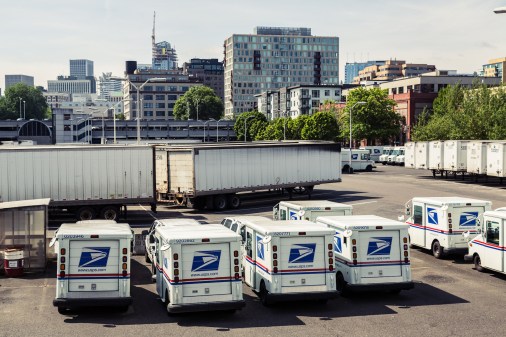The United States Postal Service can now officially start delivering groceries to your door, according to an order authorizing customized delivery from the Postal Regulatory Commission.
At the end of September, USPS filed a notice with the commission announcing its intent to continue an initial product test of grocery delivery that began several months ago in the San Francisco area in cooperation with Amazon.com Inc. One day before the newest test was scheduled to start, PRC issued its notice of authorization.
In addition to requesting permission to begin offering the grocery delivery service, USPS also applied for an exemption from a $10 million adjusted limitation, which would allow the independent agency to exceed the $10 million revenue cap established for market test products. The PRC, however, denied the USPS’ request to exceed $10 million in revenue “due to the lack of financial data to estimate revenues for customized delivery,” the order said. USPS may later resubmit the request to exceed the $10 million if it can prove that an exemption is necessary through sufficient data and calculations of estimated total revenue anticipated for each fiscal year of the test.
The Taxpayers Protection Alliance, however, reported to the PRC that the test should not move forward. In the comments filed with the commission, the alliance said the post office has a record of taking advantage of the rights and privileges it receives as a government agency and using them to “undercut the market in which they operate.”
“Inserting themselves into this industry space would simply be another way for the USPS to expand their reach without instituting real reform, not to fulfill its mandate of delivering the mail on time to its customers anywhere in the country,” David Williams, the president of the alliance, said. “The growth would work to push out already established private providers. This action works to hurt private businesses who cannot afford to bring their price down to a level where they can be competitive.”
Williams also pointed to the financial shortfalls the Postal Service has faced over the past few years and called the agency, which receives no taxpayer funding, “near a point of financial collapse.”
“A government agency should not be working to compete with American businesses,” Williams said. “The USPS needs to definitively show that the previous 60-day test of grocery delivery services was successful and that the USPS did not lose money on this project.”
The PRC’s public representative, who represents the general public, filed comments with the commission in support of the USPS’ proposal to conduct the market test but did report the “current record is inadequate for the commission to evaluate market disruption.”
In its order granting the USPS permission to conduct the grocery delivery test, the PRC said the new initiative would not cause market disruption because the prices offered by competitors are within the range of what USPS will charge.
The public representative — in this case Anne Siarnacki — also urged the commission to monitor any changes to the test and to expand the amount of data collected during the process. Additionally, the public representative recommended that the commission deny the $10 million exemption.
The PRC, in response to the notion that USPS could expand the grocery delivery service beyond the San Francisco area, required the Postal Service to provide advance notice to the commission if it intends to move the test to other geographical areas.
Instead of the original USPS data collection plan — which was set to report the volume of packages delivered, the work hours, the travel times, the total cost data and the total revenue generated — the PRC requested the USPS report volumes and revenues by fiscal quarter and attributable costs incurred during the test.
According to the PRC, the test will begin Friday, or shortly after, and will run for two years unless USPS requests an extension, requests that the product be offered permanently or ends the test early.






